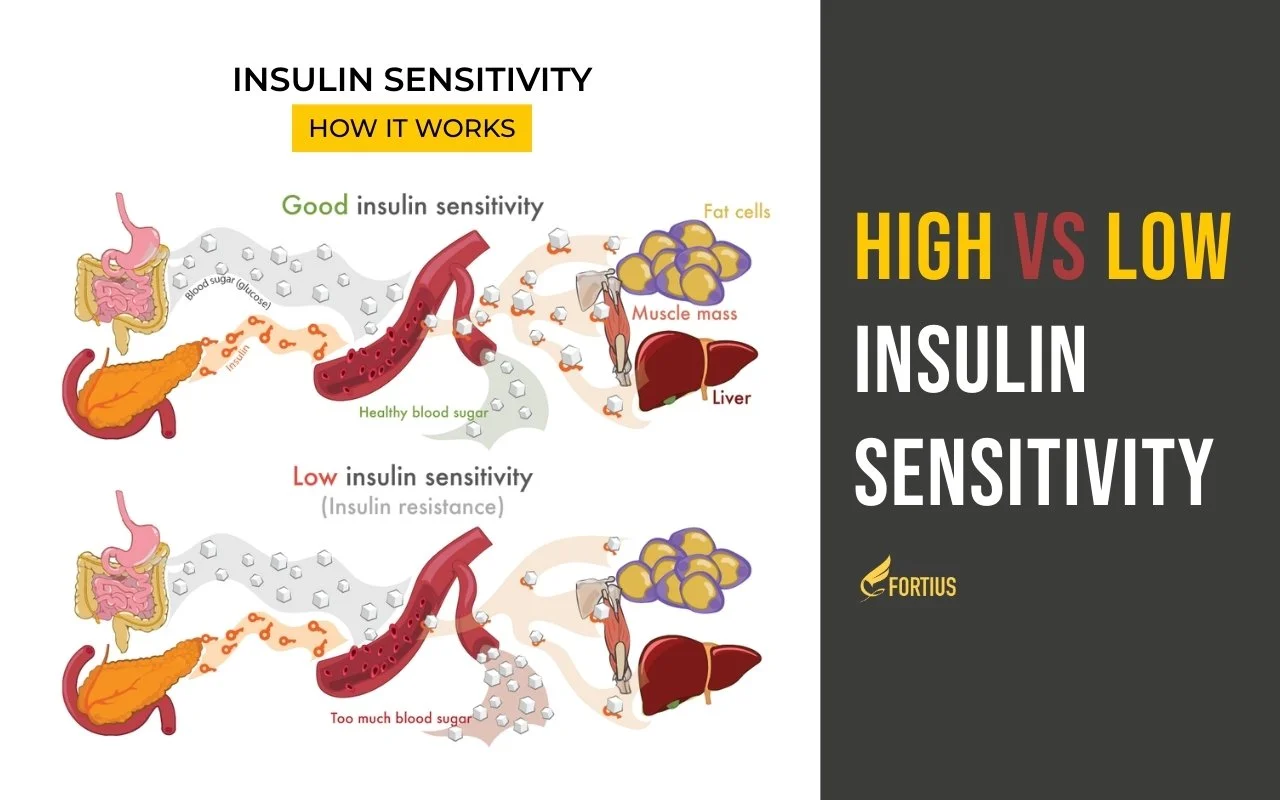How to Conquer Menopausal Belly Fat: A Guide to Insulin Sensitivity
It's one of the most common and frustrating menopausal symptoms: the sudden and stubborn accumulation of belly fat. For many menopausal women, even if you're eating and exercising the same way you always have, you may find that your body composition is changing in a way that feels out of your control. This menopause weight gain is a common experience for middle-aged women.
This isn't a failure of willpower. It's often a direct result of a key physiological shift: decreasing insulin sensitivity.
Understanding and managing your insulin sensitivity is the secret to reducing belly fat and taking back control of your body. This guide will explain the science in simple terms and provide you with powerful, actionable lifestyle hacks to improve insulin sensitivity.
What is Insulin and Why Does It Matter?
Insulin is a crucial hormone that acts like a key. When you eat carbohydrates, they are broken down into glucose (sugar) in your bloodstream. Insulin's job is to unlock the doors to your cells—primarily your muscle and liver cells—to let that glucose in to be used for energy or stored for later. This process helps to stabilize blood sugar.
Insulin sensitivity refers to how well your cells respond to insulin's key.
High Sensitivity (Good): Your cells are very responsive. It only takes a small amount of insulin to efficiently clear sugar from your blood.
Low Sensitivity / Insulin Resistance (Bad): Your cells have become "numb" to insulin's signal. Your pancreas has to pump out more and more insulin to do the same job, leading to high blood sugar levels.
The Link Between Menopause, Insulin Resistance, and Belly Fat
The decline in estrogen during menopause is a major factor that can lead to a decrease in insulin sensitivity. When your body becomes more insulin resistant, a frustrating cycle begins that encourages belly fat accumulation.
Increased Fat Storage: High levels of circulating insulin are a powerful signal for your body to store energy as body fat. This is particularly true for visceral fat, a dangerous type of deep abdominal fat that surrounds your vital organs.
Blocked Fat Burning: When insulin levels are high, it effectively locks your fat cells, preventing your body from burning stored body fat for energy.
This creates a perfect storm where your body is primed to promote fat storage and reluctant to burn it. This excess belly fat is not just a cosmetic concern; it significantly increases the risk factors for serious health issues like cardiovascular disease, high blood pressure, and metabolic syndrome.
Actionable Hacks to Improve Insulin Sensitivity
The good news is that you can dramatically improve insulin sensitivity through simple, strategic lifestyle changes. This is the key to achieving a healthy weight and improving your overall health.
Prioritize Strength Training: This is your number one tool. Regular exercise, particularly weight training, is crucial. Building and being able to maintain muscle mass gives you more "storage tanks" for glucose to go, taking the pressure off your pancreas. Every time you lift weights, you make your muscles more sensitive to insulin.
"Bookend" Your Carbs Around Your Workout: The best time to eat carbohydrates is in the hours before and after your strength training session. Your body is primed to use those carbs to fuel your workout and replenish your muscle glycogen stores, rather than storing them as fat.
Never Eat a "Naked" Carb: Adopt a balanced diet. Always pair your carbohydrate sources with protein, healthy fats, or fiber. This slows down the digestion and absorption of sugar into your bloodstream, preventing a large insulin spike. Focus on a low-glycemic index diet rich in whole grains and vegetables, and avoid processed foods.
Go for a Post-Meal Walk: A simple 10-15 minute walk after your main meals is an incredibly powerful form of physical activity. It helps your muscles soak up blood sugar, reducing the need for a large insulin response.
Master Your Sleep: Sleep disturbances, hot flashes, and night sweats are common during menopause and can lead to sleep deprivation. This is a major cause of insulin resistance and high levels of chronic stress. Prioritizing 7-9 hours of quality sleep per night is one of the most effective things you can do for your metabolic health.
Conclusion: You Are in Control
While the hormonal changes of menopause are real, they do not have to dictate your health and body composition. By understanding the role of insulin sensitivity and implementing these simple, powerful strategies, you can effectively manage menopausal weight gain and build a lean, healthy, and energetic body.
(Note: Before making significant lifestyle changes or considering options like hormone replacement therapy (HRT), it's always best to consult with your healthcare provider.)
If you're ready for a comprehensive program that combines intelligent training and nutrition to help you conquer the challenges of menopause, book a free, no-obligation consultation with a Fortius expert today.
Learn more about how to take control of your health during this new phase of your life with our blog: Fortius Blueprint for Women: How to Thrive Through Perimenopause and Menopause in Dubai.







